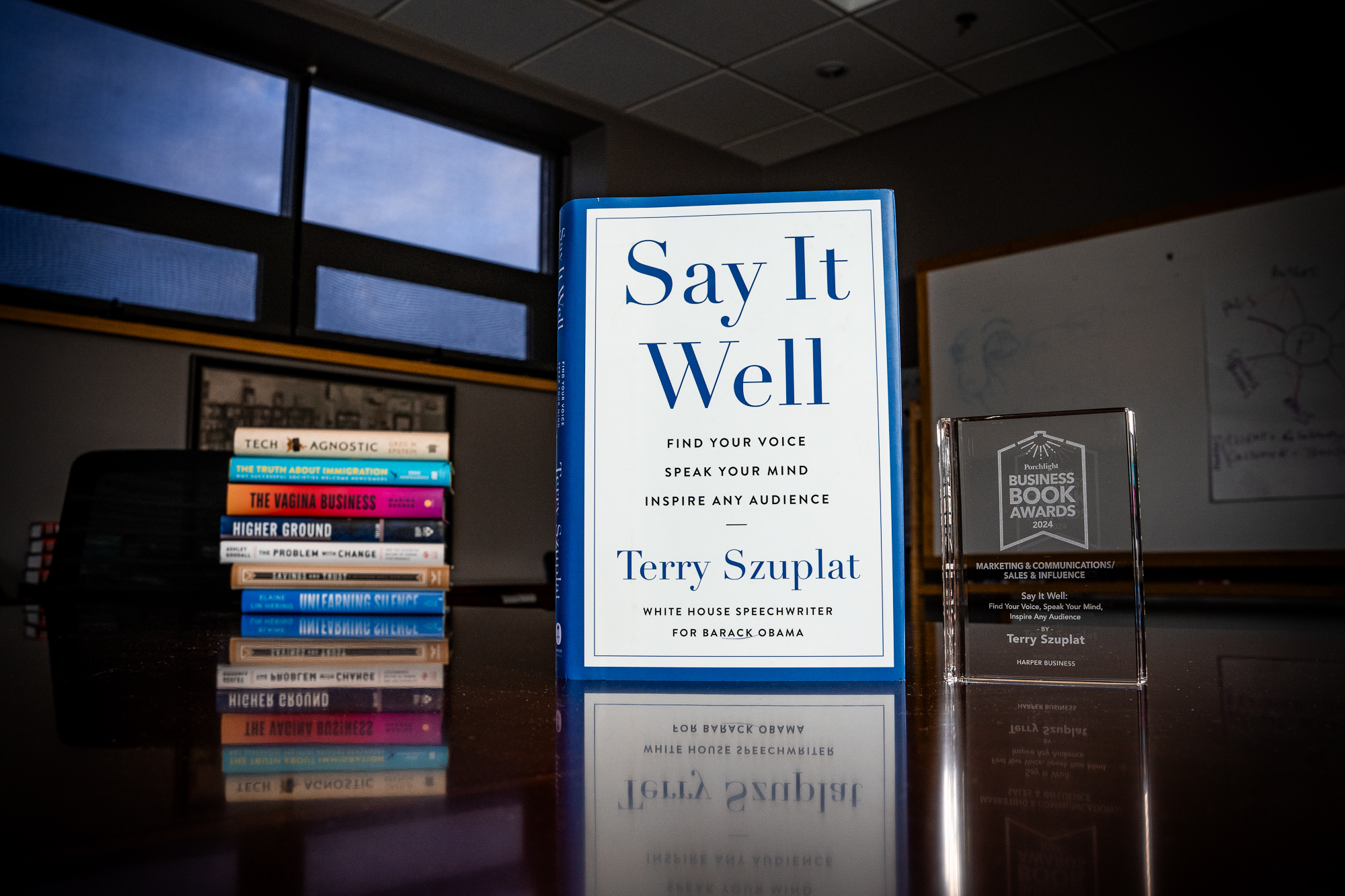Say It Well | An Excerpt from 2024 Porchlight Marketing & Communications/Sales & Influence Book of the Year
In his post about the books Porchlight chose as the best of 2024 in the Marketing & Communications/Sales & Influence category, Porchlight's Marketing & Editorial Director Dylan Schleicher wrote:
Some books that focus on a single topic end up offering universal insights. Say It Well is one of them. I think that is in part because a fear of public speaking is so common. But it is also because Szuplat’s ultimate message is that your story is worth telling, that your voice is worthy of being heard. That universal message is then made actionable through his own experience and expertise. It is a book only he could write, and will help you tell the story only you can tell.
In the excerpt below, Terry Szuplat explains why he wrote the book.

When I started writing this book, a speechwriter I’d worked with at the White House joked, “What? You’re going to give away all our secrets?!”
Well, yeah.
And why not?
Yes, speechwriters are supposed to be ghosts—heard but not seen. And for more than twenty-five years, that was me: behind the scenes, largely invisible, penning the words in private that a president, members of Congress, executives, activists, and celebrities spoke in public. But why should these leaders be the only ones to benefit from these skills?
The art of public speaking is a skill we all need—now more than ever.
It’s been two decades since a presidential speechwriter offered a book of advice on public speaking. Since then, the world has changed. A new generation of young people—diverse, restless, hopeful—are raising their voices, demanding to be heard. We’re finally beginning to talk more openly about systemic issues that for too long were swept under the rug. Everyone—whether you’re an elected official, a business executive, or a school principal—is now expected to speak to world events and complex issues of race, religion, and individual rights.
At the same time, raging political and social debates have turned language into a battlefield where words are wielded like weapons. Some people seem oblivious to how language from a bygone era, especially around race, can inflict pain on communities that historically have been marginalized. Other people can sometimes be quick to shame or condemn well-intentioned family, friends, or colleagues who struggle to keep pace with the rapidly evolving vocabulary around identity, sex, and gender.
From what I can tell, most people feel caught between the front lines—trapped in a rhetorical no-man’s land—not wanting to fall back on the coarse language of a cruel past, but unsure how to move forward without misstepping and setting off a linguistic land mine that can destroy their relationships, career, or reputation.
We’ve lost, it seems, the ability to communicate with one another.
Too many leaders seem more intent on scoring rhetorical points against their opponents than engaging in the dialogue that democracy needs in order to function. Too many speakers seem more eager to drown out those with different views than to practice the persuasion that brings more people to their cause. Our airways and communities are flooded with misinformation and cruelty—vitriol that undermines the trust, understanding, and shared sense of purpose that we need to live and work together.
The way we talk has to change.
I worry, though, that, just when we need it the most, the art of public speaking often seems more complicated and intimidating than it needs to be. Too many books on rhetoric have overlooked the voices of women, people of color, and historically marginalized communities. Some books on public speaking can make your head spin with obscure words from ancient Greece and Rome. But I’m here to tell you that you don’t need to know what chiasmus is to be a great speaker. One thing Obama never told us was “You know, this is a good speech, but what it really needs is more chiasmus.”*
All the while, technology continues to transform how we talk to one another. For the first time in history, every one of us has a megaphone—our smartphones, social media, and Zoom—that allows us to instantly share our voice with the world, with all the power and peril that it brings. With the rise of artificial intelligence, chatbots are revolutionizing how we learn, create, and communicate—with untold benefits and dangers. This may be the first book on public speaking in the age of AI, and I’ll offer some thoughts on how we might harness this technology to sharpen our voice without losing the humanity that’s at the heart of all great communication.
In short, the art of public speaking needs an upgrade—a new guide for our diverse and changing world, with practical tools for the presentations, pitches, talks, toasts, and tributes that we give in our daily lives.
I hope this book can be that guide for you.
* Chiasmus is a rhetorical device in which a phrase mirrors a previous phrase in reverse, like when President John F. Kennedy said, “Ask not what your country can do for you—ask what you can do for your country.” And yes, sometimes Obama used it, like when he said, “My job is not to represent Washington to you, but to represent you to Washington.” More often, though, Obama’s rhetoric was rooted in direct and straightforward language, which reflected his belief not in the power of leaders to inspire their people, but in the power of the people to inspire their leaders. (See what I did there?)
Excerpted from Say It Well: Find Your Voice, Speak Your Mind, Inspire Any Audience by Terry Szuplat, published by Harper Business. Copyright © 2024 by Terry Szuplat. All rights reserved.



